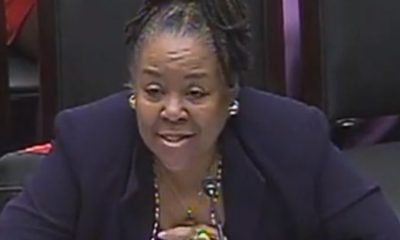#NNPA BlackPress
A Venezuelan Exodus: UIC Prof Explains What Helped Fuel Migrant Crisis, Pt. 1
CHICAGO DEFENDER — Soledad Álvarez Velasco is an Ecuadorian socio-anthropologist, human geographer and assistant professor in the Department of Anthropology and Latin American and Latino Studies at the University of Illinois at Chicago. We discussed the history of Venezuelan migration to the United States and the historical and political climate that has all but forced its citizens to migrate across the Americas. This is part 1 of our interview.
The post A Venezuelan Exodus: UIC Prof Explains What Helped Fuel Migrant Crisis, Pt. 1 first appeared on BlackPressUSA.

By Nicole Jeanine Johnson | Chicago Defender
Over the last year and a half, Chicago’s Sanctuary City designation has been tested. As of August 2022, the city has absorbed over 21,700 migrants, spreading them throughout. The influx of migrants raises one simple question among many Chicagoans: “What’s going on in Venezuela? Followed by, “Is it that bad that they have to come all the way here?”
I sat down with Soledad Álvarez Velasco, an Ecuadorian socio-anthropologist, human geographer and assistant professor in the Department of Anthropology and Latin American and Latino Studies at the University of Illinois at Chicago. We discussed the history of Venezuelan migration to the United States and the historical and political climate that has all but forced its citizens to migrate across the Americas. This is part 1 of our interview.

Soledad Álvarez Velasco, an Ecuadorian socio-anthropologist, human geographer and assistant professor in the Department of Anthropology and Latin American and Latino Studies at the University of Illinois at Chicago (Photo, UIC).
Nicole Jeanine Johnson: Prior to recent years, was Venezuela a prosperous country?
Soledad Álvarez Velasco: In the 1970s up until the 1990s, Venezuela was one of the most important destinations in the Americas for migration but also for tourism. There were people coming from Ecuador, Colombia, Peru, Argentina and even abroad in Europe like Spain and Italy. It has the largest oil reserves in the world. The oil boom propelled Venezuela to become this incredible magnet for the world.
Despite most modern-day conveniences that require oil to function, the demand did not protect against the oil price crash. In 2014, the price per barrel decreased from $100 in July 2014 to $30 by February 2016. Venezuela’s economy plummeted because it had no other industries to rely on.
Nicole Jeanine Johnson: How important was oil in the country’s economic prosperity?
Soledad Álvarez Velasco: Roughly 90% of the economy relies on oil exports. If you compare this to other countries that have been able to sustain themselves by exporting other raw materials and labor power to the global economy.
Venezuela is considered a petrostate: “The government income is deeply reliant on the export of oil and natural gas.” As such, its economy is not as diversified as others, nor is there broad taxation among its citizens. These countries do not have an appetite for development but will shore up any discontent through significant public spending.
Nicole Jeanine Johnson: Were other factors at play that exacerbated the impact of the 2014 oil crisis?
Soledad Álvarez Velasco: Yes. The U. S. [placed] sanctions on the economy, meaning that Venezuela could not export its oil. Plus, the internal collapse was due to the transition between Chávez’s and Maduro’s regimes.
From 2015 to 2019, the United States imposed sanctions on Venezuela that included “blocking Venezuela’s access to the U.S. financial system, freezing the Madura administration’s bank accounts and other assets, blocking oil imports from the state oil and gas company, Petróleos de Venezuela, S.A. (PDVSA); and imposing penalties on individuals who the U.S. government determines have undermined democratic processes or committed human rights abuses.” As a result, the Venezuelan economy contracted as their gross domestic product growth plummeted from minus 25% in 2015 to 35% by 2019.
Nicole Jeanine Johnson: As this is a recipe for disaster, how have these factors contributed to the country’s mass exodus?
Soledad Álvarez Velasco: So the fall of the oil prices in the global economy, commodities, sanctions and the internal collapse of its state has provoked this massive exodus. We haven’t witnessed any exodus of such magnitude in the region ever in the scope of its 14 years. Since 1999, up until the present, [nearly] 8 million Venezuelans have left their country.
Venezuela’s mass exodus has been churning since 2015. Although the United States has absorbed a considerable number seeking asylum, neighboring South American countries have borne the brunt. According to the United States High Commission for Refugees, Colombia and Peru have received the most migrants at 2.9 million and 1.5 million, respectively.
The post A Venezuelan Exodus: UIC Prof Explains What Helped Fuel Migrant Crisis, Pt. 1 appeared first on Chicago Defender.
The post A Venezuelan Exodus: UIC Prof Explains What Helped Fuel Migrant Crisis, Pt. 1 first appeared on BlackPressUSA.
#NNPA BlackPress
IN MEMORIAM: Ramona Edelin, Influential Activist and Education Advocate, Dies at 78
NNPA NEWSWIRE — Born on September 4, 1945, in Los Angeles, California, activist Ramona Edelin’s early years were marked by a commitment to education and social justice. According to her HistoryMakers biography, after graduating from Fisk University with a Bachelor’s degree in 1967, she pursued further studies at the University of East Anglia in England. She earned her master’s degree before completing her Ph.D. at Boston University in 1981.
The post IN MEMORIAM: Ramona Edelin, Influential Activist and Education Advocate, Dies at 78 first appeared on BlackPressUSA.

By Stacy M. Brown, NNPA Newswire Senior National Correspondent
@StacyBrownMedia
Once upon a time, Black Americans were simply known as colored people, or Negroes. That is until Ramona Edelin came along. The activist, renowned for her pivotal roles in advancing civil rights, education reform, and community empowerment, died at her D.C. residence last month at the age of 78. Her death, finally confirmed this week by Barnaby Towns, a communications strategist who collaborated with Dr. Edelin, was attributed to cancer.
Born on September 4, 1945, in Los Angeles, California, Edelin’s early years were marked by a commitment to education and social justice. According to her HistoryMakers biography, after graduating from Fisk University with a Bachelor’s degree in 1967, she pursued further studies at the University of East Anglia in England. She earned her master’s degree before completing her Ph.D. at Boston University in 1981.
Edelin’s contributions to academia and activism were manifold. She was pivotal in popularizing the term “African American” alongside Rev. Jesse L. Jackson in the late 1980s.
Jackson had announced the preference for “African American,” speaking for summit organizers that included Dr. Edelin. “Just as we were called Colored, but were not that, and then Negro, but not that, to be called Black is just as baseless,” he said, adding that “African American” “has cultural integrity” and “puts us in our proper historical context.”
Later, Edelin told Ebony magazine, “Calling ourselves African Americans is the first step in the cultural offensive,” while linking the name change to a “cultural renaissance” in which Black Americans reconnected with their history and heritage.
“Who are we if we don’t acknowledge our motherland?” she asked later. “When a child in a ghetto calls himself African American, immediately he’s international. You’ve taken him from the ghetto and put him on the globe.”
The HistoryMakers bio noted that Edelin’s academic pursuits led her to found and chair the Department of African American Studies at Northeastern University, where she established herself as a leading voice.
Transitioning from academia to advocacy, Edelin joined the National Urban Coalition in 1977, eventually ascending to president and CEO. During her tenure, she spearheaded initiatives such as the “Say Yes to a Youngster’s Future” program, which provided crucial support in math, science, and technology to youth and teachers of color in urban areas. Her biography noted that Edelin’s efforts extended nationwide through partnerships with organizations like the National Science Foundation and the United States Department of Education.
President Bill Clinton recognized Edelin’s expertise by appointing her to the Presidential Board on Historically Black Colleges and Universities in 1998. She also co-founded and served as treasurer of the Black Leadership Forum, solidifying her standing as a respected leader in African American communities.
Beyond her professional achievements, Edelin dedicated herself to numerous boards and committees, including chairing the District of Columbia Educational Goals 2000 Panel and contributing to the Federal Advisory Committee for the Black Community Crusade for Children.
Throughout her life, Edelin received widespread recognition for her contributions. Ebony magazine honored her as one of the 100 Most Influential Black Americans, and she received prestigious awards such as the Southern Christian Leadership Award for Progressive Leadership and the IBM Community Executive Program Award.
The post IN MEMORIAM: Ramona Edelin, Influential Activist and Education Advocate, Dies at 78 first appeared on BlackPressUSA.
#NNPA BlackPress
Tennessee State University Board Disbanded by MAGA Loyalists as Assault on DE&I Continues
NNPA NEWSWIRE — Recent legislative actions in Tennessee, such as repealing police reform measures enacted after the killing of Tyre Nichols, underscore a troubling trend of undermining local control and perpetuating racist agendas. The new law preventing local governments from restricting police officers’ authority disregards community efforts to address systemic issues of police violence and racial profiling.
The post Tennessee State University Board Disbanded by MAGA Loyalists as Assault on DE&I Continues first appeared on BlackPressUSA.

By Stacy M. Brown, NNPA Newswire Senior National Correspondent
@StacyBrownMedia
Tennessee State University (TSU), the state’s only public historically Black college and university (HBCU), faces a tumultuous future as Gov. Bill Lee dissolved its board, a move supported by racist conservatives and MAGA Republicans in the Tennessee General Assembly, who follow the lead of the twice-impeached, four-times indicted, alleged sexual predator former President Donald Trump. Educators and others have denounced the move as an attack on diversity, equity, and inclusion (DE&I) and a grave setback for higher education.
Critics argue that TSU’s purported financial mismanagement is a manufactured crisis rooted in decades of underinvestment by the state government. They’ve noted that it continues a trend by conservatives and the racist MAGA movement to eliminate opportunities for Blacks in education, corporate America, and the public sector.
Gevin Reynolds, a former speechwriter for Vice President Kamala Harris, emphasizes in an op-ed that TSU’s financial difficulties are not the result of university leadership because a recent audit found no evidence of fraud or malfeasance.
Reynolds noted that the disbanding of TSU’s board is not an isolated incident but part of a broader assault on DE&I initiatives nationwide. Ten states, including Tennessee, have enacted laws banning DE&I policies on college campuses, while governors appointing MAGA loyalists to university trustee positions further undermine efforts to promote inclusivity and equality.
Moreover, recent legislative actions in Tennessee, such as repealing police reform measures enacted after the killing of Tyre Nichols, underscore a troubling trend of undermining local control and perpetuating racist agendas. The new law preventing local governments from restricting police officers’ authority disregards community efforts to address systemic issues of police violence and racial profiling.
The actions echo historical efforts to suppress Black progress, reminiscent of the violent backlash against gains made during the Reconstruction era. President Joe Biden warned during an appearance in New York last month that Trump desires to bring the nation back to the 18th and 19th centuries – in other words, to see, among other things, African Americans back in the chains of slavery, women subservient to men without any say over their bodies, and all voting rights restricted to white men.
The parallels are stark, with white supremacist ideologies used to justify attacks on Black institutions and disenfranchise marginalized communities, Reynolds argued.
In response to these challenges, advocates stress the urgency of collective action to defend democracy and combat systemic racism. Understanding that attacks on institutions like TSU are symptomatic of broader threats to democratic norms, they call for increased civic engagement and voting at all levels of government.
The actions of people dedicated to upholding the principles of inclusivity, equity, and justice for all will determine the outcome of the ongoing fight for democracy, Reynolds noted. “We are in a war for our democracy, one whose outcome will be determined by every line on every ballot at every precinct,” he stated.
The post Tennessee State University Board Disbanded by MAGA Loyalists as Assault on DE&I Continues first appeared on BlackPressUSA.
#NNPA BlackPress
Braxton Haulcy and the Expansion of Walker|West Music Academy
May 24, 2023 – Walker West Music Academy gets an early start on expansion. Join us for a Wednesday episode of The …
The post Braxton Haulcy and the Expansion of Walker|West Music Academy first appeared on BlackPressUSA.

May 24, 2023 – Walker West Music Academy gets an early start on expansion. Join us for a Wednesday episode of The …
The post Braxton Haulcy and the Expansion of Walker|West Music Academy first appeared on BlackPressUSA.
-

 Activism4 weeks ago
Activism4 weeks agoOakland Post: Week of March 27 – April 2, 2024
-

 #NNPA BlackPress4 weeks ago
#NNPA BlackPress4 weeks agoBeloved Actor and Activist Louis Cameron Gossett Jr. Dies at 87
-

 Community2 weeks ago
Community2 weeks agoFinancial Assistance Bill for Descendants of Enslaved Persons to Help Them Purchase, Own, or Maintain a Home
-

 Activism3 weeks ago
Activism3 weeks agoOakland Post: Week of April 3 – 6, 2024
-

 Business2 weeks ago
Business2 weeks agoV.P. Kamala Harris: Americans With Criminal Records Will Soon Be Eligible for SBA Loans
-

 Activism2 weeks ago
Activism2 weeks agoOakland Post: Week of April 10 – 16, 2024
-

 Community2 weeks ago
Community2 weeks agoAG Bonta Says Oakland School Leaders Should Comply with State Laws to Avoid ‘Disparate Harm’ When Closing or Merging Schools
-

 Community1 week ago
Community1 week agoOakland WNBA Player to be Inducted Into Hall of Fame

























































